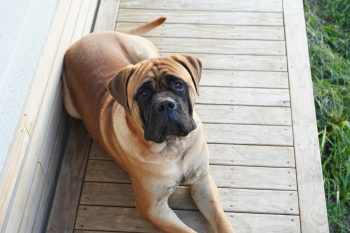Bullmastiffs, known for their formidable size and loyal nature, are a breed that commands respect and admiration. Originally bred as estate guardians, they possess a unique blend of strength, courage, and gentleness. Despite their many admirable qualities, owning a Bullmastiff is not without its challenges. Potential owners should be well aware of these challenges to ensure they can provide a suitable and happy home for these gentle giants. This article aims to explore seven downsides of owning a Bullmastiff, offering a realistic perspective while still appreciating the many positive aspects of the breed. Understanding these challenges is crucial for prospective Bullmastiff owners to ensure a successful and rewarding experience for both the dog and the owner.
7 Reasons Why Bullmastiffs Might Not Be Right For You
Large Size and Space Requirements: Bullmastiffs are a giant breed, requiring ample space in homes and vehicles. Their size can be challenging for those with limited living space or for those not accustomed to handling large dogs.
Drooling: This breed is known for drooling, especially after eating or drinking. Owners need to be prepared for regular cleanups and may find this aspect less appealing.
Exercise and Activity Needs: Despite their laid-back nature, Bullmastiffs need regular exercise to maintain good health and prevent obesity. Their exercise needs must be balanced carefully due to their large size and potential joint issues.
Potential Health Problems: Like many large breeds, Bullmastiffs are prone to certain health issues, including hip and elbow dysplasia, heart conditions, and bloat. These health concerns require attention and can lead to significant veterinary expenses.
Training and Socialization: Early and consistent training and socialization are crucial for Bullmastiffs. Given their size and protective nature, they must be well-trained and socialized to ensure they are safe and well-behaved around people and other animals.
Guarding Instincts: Their natural guarding instincts can be a double-edged sword. While it provides a sense of security, it also means they can be wary of strangers and protective of their family, which needs to be managed responsibly.
Shorter Lifespan: Unfortunately, like many large dog breeds, Bullmastiffs have a relatively short lifespan, averaging around 8-10 years. This can be a significant emotional consideration for potential owners.
Owning a Bullmastiff can be a deeply rewarding experience. They are loyal, protective, and have a gentle disposition that makes them excellent companions. While there are notable challenges in caring for a Bullmastiff, being well-informed and prepared can lead to a fulfilling and loving relationship. Bullmastiffs, with their striking presence and affectionate nature, can bring immense joy and a sense of security to the right home, making the efforts of their care well worth it.
On The Other Hand…
5 Positive Qualities About Bullmastiffs
Loyal and Protective: Bullmastiffs are known for their unwavering loyalty and natural protective instincts. They are deeply devoted to their families and make excellent guard dogs, providing a strong sense of security for their owners.
Gentle and Affectionate with Family: Despite their imposing size, Bullmastiffs are gentle giants, especially around their loved ones. They show great affection and tenderness to their family members, making them wonderful companions.
Low Exercise Requirements: Compared to other large breeds, Bullmastiffs have relatively low exercise requirements. They are content with moderate daily walks and some playtime, making them suitable for various living situations.
Quiet Nature: Bullmastiffs are not known to be excessive barkers. They tend to be quiet and reserved, making them good house pets, especially in environments where excessive noise is a concern.
Intelligent and Trainable: This breed is intelligent and responds well to consistent, positive training methods. Their eagerness to please and ability to learn quickly makes them trainable pets, capable of mastering basic commands and good behaviors.
Bullmastiffs possess a unique combination of strength, loyalty, and gentleness. Their protective nature, coupled with their affectionate and calm demeanor towards their family, makes them excellent companions. While they may present certain challenges due to their size and strength, their intelligence, low exercise needs, and quiet nature balance these aspects, making Bullmastiffs a rewarding and loving addition to the right home.
The post Are Bullmastiffs The Worst Dog? – Food for Thought appeared first on iHeartDogs.com.

